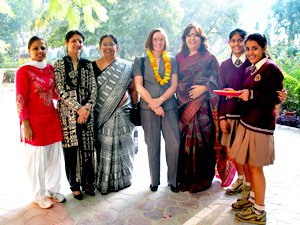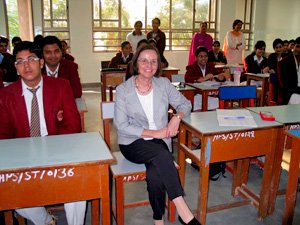Greetings from India: PBL Gaining a Foothold
Your content has been saved!
Go to My Saved Content.I'm here as a guest of The Achievers Programme (TAP), an India-based organization that aspires to help students prepare for the future by becoming more critical thinkers and self-directed learners. In addition to hosting cultural exchanges and other enriching experiences for students, TAP invites about 15 international presenters a year to conduct hands-on workshops for teachers. Since 1995, more than 10,000 teachers have taken part in workshops addressing everything from multiple intelligences to bullying prevention. My workshop focus is project-based learning, with an emphasis on real-world projects supported by technology.
Here are a few highlights from the road.

Learning Together
When I arrived a few days ago at Alwar Public School in the state of Rajasthan, I was greeted by a welcoming committee of students who placed a red bindi on my forehead and a garland of marigolds around my neck. The night before, over platters of delicious Indian food shared with several teachers and administrators, I had a chance to learn about this 30-year-old private school that enrolls 1,600 students. One of three schools managed by the Good Earth Foundation, it's considered the highest-achieving school in this city of about half a million.
Key to the school's success, I quickly discovered, is its collaborative faculty and progressive leadership. Anshu Beniwal, a veteran educator who is coordinator of academics, started introducing and encouraging project-based learning here about two years ago. "I planted the seed," she said, "but teachers have made it grow."
The 40-plus teachers I had the pleasure of working with demonstrated a willingness to try new strategies. They also showed plenty of creativity when it came to project ideas, especially projects that will connect students with their local community. For example, not far from Alwar is a tiger sanctuary. Soon, Alwar students are likely to be advocating for the protection of habitat for these majestic animals. Another project idea focused on rainwater harvesting and drinking water purification. This could result in students designing lifesaving solutions for villagers in the region.
When it was time to talk about project assessment, I was happy to learn that teachers here have already designed common rubrics that are used across subject areas and grade levels. They also understand the importance of having students present their project results to an authentic audience. These shared practices are helping to build a culture that supports PBL.
The students I had a chance to talk with were enthusiastic about their first project experiences -- especially the social aspect of working in teams and taking field trips for research. What they seemed most curious about, however, was how they compare to American students. "Ma'am, do we study harder?" one girl asked me. I pointed out that she and her classmates were attending school on a Saturday -- a day off for U.S. students. Their school year lasts more than 220 days, several weeks longer than in my home state of Oregon. The formality of their classroom -- where teachers are addressed as ma'am or sir and students stand when a visitor enters the room -- was another difference between East and West.
When I suggested that they might want to connect with American students -- perhaps for a collaborative project that would enable them to get acquainted virtually -- I was greeted with a flurry of head bobs.

PBL Taking Hold
Alwar Public School is just one of many I'm getting a chance to visit, but in many ways it represents the future of education in India. It's in private schools that progressive ideas like PBL are gaining a foothold. Meanwhile, tradition-bound government schools stick with covering the curriculum and preparing students for big tests.
In a recent article here in the Hindustan Times, the perils of tradition were spelled out in an op-ed piece by Abhijit Banerjee, Ford Foundation international professor of economics and director, Abdul Latif Jameel Poverty Action Lab at MIT. Citing a recent report on the status of Indian education, he bemoaned the fact that about half of students in government schools lag years behind grade level in reading and fare even worse in math. Results are only slightly better at private schools, where even poor families struggle to send their children to help them gain an edge.
Why? Here's Banerjee's theory: "The goal of education is to permit the most successful students to get through the difficult exams that get thrown at them and hit the jackpot of a government job or a place in an engineering school. The rest, unavoidably, will just drop out."
Shifting to PBL offers an alternative. It's not without challenges, especially when class sizes approach 40 and technology is confined to a computer lab. But so far, the teachers I've met seem to think it's worth the effort to help their students prepare for the future.
Brokering Introductions
Teachers in India seem as keen as their students to connect with American schools. If you're interested in collaborating with an Indian school or just connecting for a Skype chat, please respond in the comments. I've met some wonderful teachers who would be only too happy to expand their network.